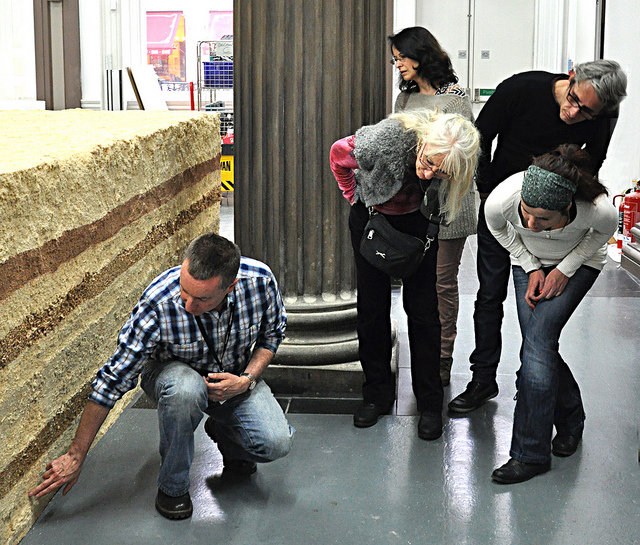National Committees
Article Index

The aim of the Committee is to promote the conservation, protection, rehabilitation and enhancement of monuments, groups of buildings, and sites, at the national and international levels and in accordance with definitions in Article 3 of the ICOMOS Statutes.
National Committees serve as a forum where individuals and representatives of institutions concerned with the conservation, protection, rehabilitation and enhancement of architectural heritage can meet to exchange information and views on principles, doctrinal matters, but also on technical, legal and administrative practices, affecting the conservation, restoration, rehabilitation and enhancement of monuments, groups of buildings, and sites.
The National Committees represent ICOMOS’ interests at the national level, and their member’s views within the international network. They engage their members in national and regional initiatives. National Committees can undertake specific activities on their own initiatives or at the request of their governments. National Committees are a channel through which individual specialists in each country take part in ICOMOS' international activities including, for example, specific missions entrusted to ICOMOS by UNESCO.
Through the annual meetings of the ICOMOS Advisory Committee, National Committees can exert a decisive influence on the programme priorities of ICOMOS. National Committees can also volunteer to take responsibility (in close co-operation with the ICOMOS International Secretariat in Paris) for part of ICOMOS' international programme which is of particular concern to their country. The National Committees implement, locally, the proposed programs of the Board.
- Dubrovnik-Valletta Principles for National Committees (last update: 9 October 2009)
Photo: © Helen Simonsson / Flickr
Organisation of a National Committee
Each National Committee must agree to accept the Statutes of ICOMOS. Its own statutes should conform with national requirements and practices, as well as with the ICOMOS Statutes.
Presidents of ICOMOS National Committees are elected or appointed from among their members. The President is responsible for calling at least one meeting of the National Committee each year. Other officers elected by the Committee may assist the President. Committees are urged to have a Secretary or a Secretary-Treasurer. Unless the President requests otherwise, all communications from the ICOMOS International Secretariat are addressed to him. Presidents of National Committees are automatically members of the ICOMOS Advisory Committee and are expected to attend and to take part in its annual meeting (or to send a member of heir National Committee in their place).
National Committee statutes must be submitted to the ICOMOS Board for ratification.
 How to establish a National Committee?
How to establish a National Committee?
If a National Committee does not exist in your country and you want to create one, you can contact the ICOMOS International Secretariat to obtain information.
ICOMOS National Committees may be established in any country which is a member state of UNESCO. ICOMOS National Committees must have at least five individual members. The establishment of a new ICOMOS National Committee is subject to the approval of the ICOMOS Board at its next meeting (the Board meets at least once a year).
A suggested model for drafting ICOMOS National Committee statutes is available at the International Secretariat.
A particular case: ICOMOS Pasifika regional Committee (read more - see next page)
 ICOMOS Pasifika - International Committee of the Pacific Islands
ICOMOS Pasifika - International Committee of the Pacific Islands
The first Board of ICOMOS Pasifika was elected in 2007. The Committee aims to further the conservation and protection of heritage places in the Pacific Islands, with a focus on the cultural and natural specificities of the region. In particular, the Committee will raise awareness with regards to the conservation of heritage places in the Pacific Islands amongst local, national and regional cultural organisations in the region; act as an expert body to promote regional cooperation amongst professionals involved in studies relating to heritage places in the region; provide a forum for discussion and for information exchange, regionally and internationally, on matters of principle and of technical, legal and administrative practice affecting the conservation of heritage places in the region; and focus on the provision of information to the general public, traditional landowners and political organisations about the conservation of heritage places in the region.
Image : Ile de Vanuatu - © Gus MacLeod / Flickr
How to become a member?
Professionals interested in working in the field of cultural heritage (architects, town planners, historians, archaeologists, ethnologists or archivists, and in certain cases other individuals interested in supporting the aims and objective of ICOMOS) can make a membership request to ICOMOS by the intermediary of their National Committee.
If there is no National Committee in a country, the membership requests have to be addressed to the ICOMOS International Secretariat for approval by the ICOMOS Executive Committee. The ICOMOS members belonging to countries where there is no National Committee have the same rights than the members of National Committees.
All the ICOMOS members of a country make up the National Committee of the country. Once a National Committee is created, all the membership requests to the International Secretariat are forwarded to the National Committee.
→ Join ICOMOS - Detailed information
Addresses & Contacts of National Committees
ICOMOS currently has 115 National Comittees. To contact or join a Committee, please click on the link below:
→ ![]() Addresses & contacts of ALL National Committees
Addresses & contacts of ALL National Committees
National Committees' websites:
Argentina
Australia
Austria
Bangladesh
Belgium
Bosnia-Herzegovina
Brazil
Bulgaria
Canada
Chile
China
Colombia
Costa Rica
Denmark
Deutschland
Estonia
Finland
France
Georgia
Germany
Hungary
Iceland
India
Iran
Ireland
Israel
Italy
Japan
Jordan
Korean Republic
Lithuania
Malaysia
Malta
Mexico
Netherlands
Norway
New-Zealand
Pakistan
Peru
Philippines
Poland
Portugal
Russian Federation
Serbia
Singapore
Slovenia
Spain
Sri Lanka
Sweden
Switzerland
Thailand
Turkey
United-Kingdom
USA
